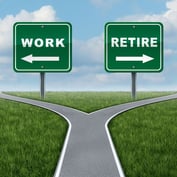As the pandemic recedes, a return to normal life — maybe a new normal — is increasingly in view. But the shift to reporting to offices in person will likely be fraught with psychological issues.
“My biggest prediction is that we’re going to have a tsunami of mental health worries. This will be a really rough period,” business psychologist Melanie Katzman forecasts in an interview with ThinkAdvisor.
After working from home and doing virtual meetings for some 14 months now, employees are feeling anxious and awkward about returning to shared physical space, Katzman says.
She maintains a clinical practice in New York City and has held faculty posts in psychiatry at Weill Cornell Medical Center and the University of London.
Management should expect high levels of tension both from workers who want to be back to the office and those who don’t, argues the psychologist, whose New York-based Katzman Consulting numbers clients that include AllianceBernstein, Goldman Sachs, PricewaterhouseCoopers and ViacomCBS.
Polls have found that about half the workers returning to offices are feeling anxious about getting back to “normal life,” according to Katzman.
When it comes to financial advisors, she appreciates that in-person meetings with prospects are vital to developing relationships. Katzman argues, however, that FAs should hold off on trying to arrange these.
As people transition from pandemic life and are feeling anxious about what lies ahead, they are in no mood to be “pitched,” she says.
In the interview, Katzman argues that the pandemic taught valuable lessons in alternative ways jobs can be executed, among other positives.
“If you just try to replicate what was there before,” she says, “you’ve lost what the pandemic gave us.”
Katzman, who was a senior fellow at Wharton Business School’s Center for Leadership and Change Management, is a partner in the international social enterprise Leaders’ Quest.
A popular speaker and business coach, she regularly provides free advice and coping strategies via social media and publishes a monthly newsletter as well.
ThinkAdvisor recently interviewed the psychologist, speaking by phone from Memphis, Tennessee.
About the return to offices, she noted that people need to renew their interpersonal skills, which rusted in lockdown and afterward with limited social interaction.
Katzman suggests giving a welcoming smile to co-workers. “Even if you have a mask on,” she says, “your eyes show it.”
Here are highlights from our conversation:
THINKADVISOR: Post-pandemic, what do you foresee happening in business offices from a psychological perspective?
MELANIE KATZMAN: My biggest prediction is that we’re going to have a tsunami of mental health worries. Companies need to be prepared for that.
The amount of emotion that people are experiencing now is across a very wide spectrum. They feel anxious and awkward about returning to the office. We can’t pretend that everything is fine and normal. This will be a really rough period.
What do you see as the scenario when employees return to their offices?
Not everybody wants to be back at the office. It will be very hard for companies that are either not direct service or production to go full time [in-person]. There’ll be a lot of tension that needs to be managed.
For example, there’ll be tension in companies that dictate versus those that have conversations with employees. There’ll be tension between people who are vaccinated and those who aren’t.
A lot of tension will stem from the civil unrest we had during the pandemic.
There was a real reckoning in a lot of companies and an unleashing of emotion, which hasn’t been resolved.
To what extent are firms requiring employees to return to the office?
Certain companies have always said, “Everybody has to be in the office.” Now some are saying, “It turns out we were able to function without people being in the office, so we’re going to a required three or four days.”
But some firms, such as Goldman Sachs, are saying, “Everybody back!”
Others, like private equity firms, are saying, “Everybody back!” But the employees are saying, “No, I’m not doing that: I travel to look at assets and deals. Why do I need to come into the office on the other days?” So there’s a lot of resentment.
Well, then, are senior managers facing some major challenges?
Companies need to take a hard look at how to give people more flexible arrangements about being in the office. They need to have conversations company-wide about things they found that challenge the assumptions they had — and that have worked. Like “Do we always have to be in the office in person?” “Do we always have to be on an airplane?”
However, it’s really important to realize that people were working at home during a pandemic, and that’s different from working at home when the world is open. We don’t know what that looks like yet.
What are the biggest impediments for employees in the move from working in virtual space to sharing physical space?









 June 03, 2021 at 11:27 AM
June 03, 2021 at 11:27 AM











